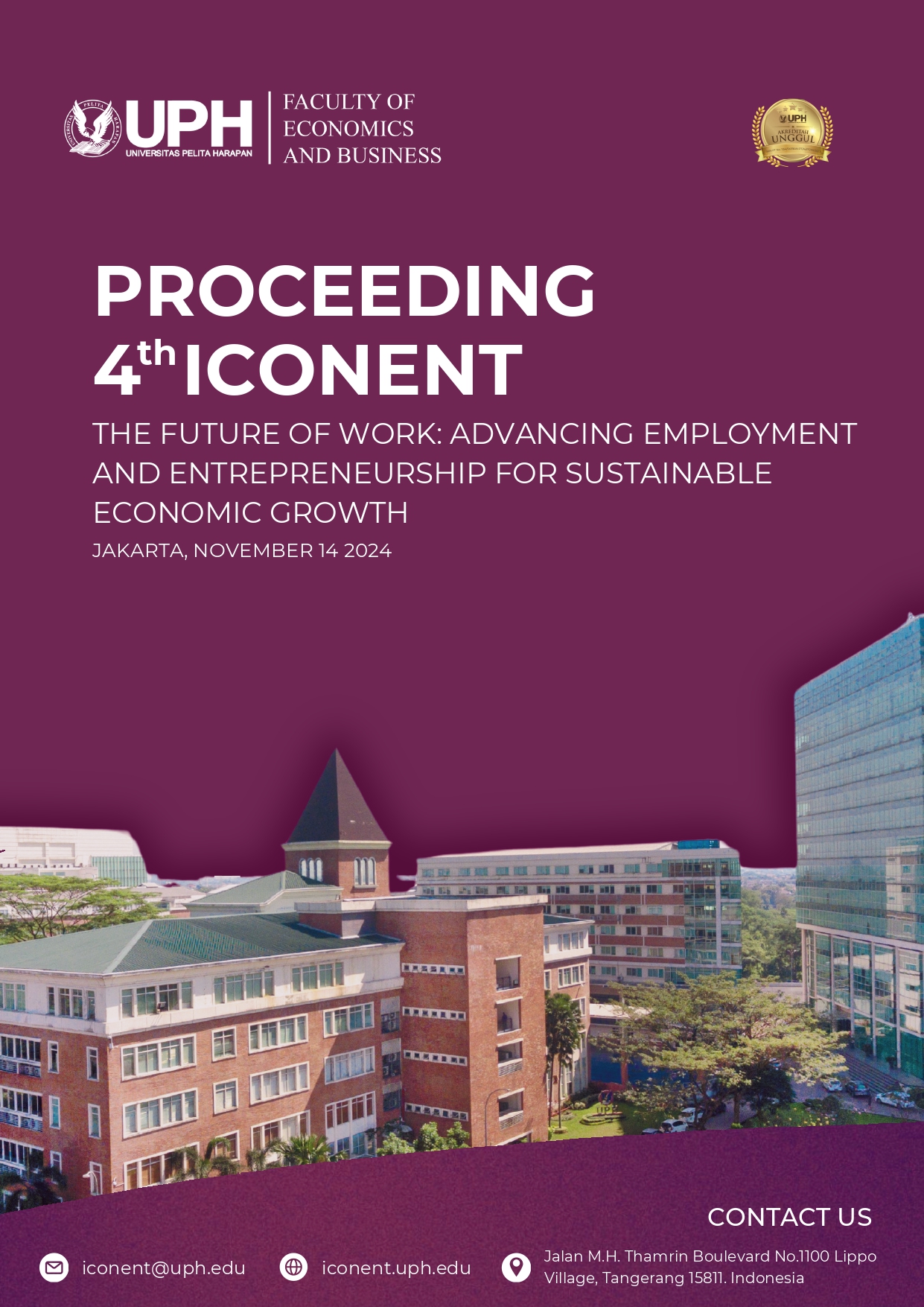Contingent Fit between Business Strategy and Environmental Uncertainty: The Impact on Tax Avoidance in Manufacturing Companies
Λέξεις-κλειδιά:
Prospector Strategy, Defender Strategy, Environmental Uncertainty, Contingent Fit, Tax AvoidanceΠερίληψη
The study aimed to examine the contingent fit level between business strategy and environmental uncertainty using tax avoidance with book-tax differences as the dependent variable, business strategy and environmental uncertainty as independent variables and included five types of control variables consisting of leverage, property, plant and equipment, inventory intensity, firm size and return on assets. The study used samples from manufacturing companies with a total sample of 510 observations from 2,050 observations for 5 years from 2015-2019 taken from S&P Capital IQ. The data processing carried out results from treatment using the Win so rize method with 5% on the dependent variable, namely BTD, and the control variable on ROA. The study's results prove that the contingent fit level between business strategy and environmental uncertainty has a negative and insignificant effect on tax avoidance. Meanwhile, environmental uncertainty has a positive and significant effect on tax avoidance.
Αναφορές
Anggraini, F., Astri, N. D., & Minovia, A. F. (2020). Pengaruh Strategi Bisnis, CapitalIntensity dan Ultinationality terhadap Tax Avoidance, 14(2), 36-45. From https://jurnal.umsb.ac.id/index.php/menarailmu/article/view/1961
Arieftiara, D., Utama, S., & Wardhani, R. (2017). Environmental Uncertainty as a Contingent Factor of Business Strategy Decisions: Introducing an Alternative Measure of Uncertainty, 11(4), 116-130. From
https://ro.uow.edu.au/cgi/viewcontent.cgi?referer=https://www.google.com/& httpsredir=1&article=1824&context=aabfj
Arieftiara, D., Utama, S., Wardhani, R., & Rahayu, N. (2019). Contingent fit betweenbusiness strategies and environmental uncertainty: The Impact on corporate tax avoidance in Indonesia, 28(1), 139-167. doi:10.1108/MEDAR-05-2018- 0338
Einsenhardt, K. M. (1989). Agency Theory: An Assessment and Review, 14(1), 57-74. doi:doi.org/10.2307/258191
Faradiza, S. A. (2019). Dampak Strategi Bisnis terhadap Penghindaran Pajak, 4(1),108-116. From https://jurnal.polibatam.ac.id/index.php/JAAT/article/view/1199
Freeman, R. E., & Reed, D. L. (1983). Stockholders and Stakeholders: A New Perspective on Corporate Governance, 25(3).doi:https://doi.org/10.2307/41165018
Higgins, D., Omer, T. C., & Phillips, J. D. (2015). The Influence of a Firm's Business Strategy on its Tax Aggressiveness, 1-29. doi:doi.org/10.1111/1911- 3846.12087
Huang, H., Sun, L., & Zhang, J. (2017). Advances in Taxation. Environmental Uncertainty and Tax Avoidance, 24, 83-124. doi:doi.org/10.1108/S1058- 749720170000024002
Ihsan, M., & Mustikasari, E. (2018). The Effect of Strategy Business on Tax Aggressiveness, 416-
421. From https://www.scitepress.org/Papers/2018/70221/70221.pdf
Jensen, M. C., & Meckling, W. H. (1976). Theory of The Firm: Managerial Behavior,Agency Costs and Ownership Structure, 305-360. From https://josephmahoney.web.illinois.edu/BA549_Fall%202012/Session%205/5
_Jensen_Meckling%20(1976).pdf
Laksono, D. G., & Firmansyah, A. (2020). The Role of Managerial Ability in Indonesia: Investment Opportunity Sets, Environmental Uncertainty, Tax Avoidance, 8(4), 1305- 1318. doi:doi.org/10.18510/hssr.2020.84123
Miles, R. E., Snow, C. C., Meyer, A. D., & Coleman, H. J. (1978). Organizational Strategy, Structure and Process, 3(3), 546-562. doi:doi.org/10.2307/257544
Otley, D. T. (1980). The Contingency Theory of Management Accounting:Achievement and Prognosis, 83-106. doi:doi.org/10.1007/978-1-4899-7138- 8_5
Otley, D. T. (2016). The contingency theory of management accounting and control:, 45-62. doi:doi.org/10.1016/j.mar.2016.02.001
Putri, R. K., & Syafruddin, M. (2021). Pengaruh Kecocokan Kontinjen antara Strategi Bisnis dengan Ketidakpastian Lingkungan terhadap Penghindaran Pajak, 10(2), 1-12. From https://ejournal3.undip.ac.id/index.php/accounting/article/view/31040
Ratu, M. K., & Siregar, S. V. (2018). Does Managerial Ability and Corporate Governance Mitigae Tax Avoidance Activities when Environmental Uncertainty is Considered?, 328-333. doi:doi.org/10.2991/iconies-18.2019.66
Seviana, A. A., & Kristanto, A. B. (2020). Ketidakpastian Lingkungan dan Tendensi Agresivitas Pelaporan Keuangan versus Pajak: Efek Moderasi Kecakapan Manajerial, 10(1), 1-11.
From https://ejournal.undiksha.ac.id/index.php/JJA/article/viewFile/24130/14909 Wahyuni, L., Fahada, R., & Atmaja, B. (2017). The Effect of Business Strategy, Leverage,
Profitability and Sales Growth on Tax Avoidance, 16(2), 67-80. From https://www.trijurnal.lemlit.trisakti.ac.id/imar/article/view/4686/pdf
Wardani, D. K., & Khoiriyah, D. (2018). Pengaruh Strategi Bisnis dan Karakteristik Perusahaan,
2(1). From https://jurnal.ustjogja.ac.id/index.php/akuntansidewantara/article/view/2181 Yu, C. L., Wang, F., & Brouthers, K. D. (2016). Competitor identification, perceived
environmental uncertainty, and firm performance, 21-35. doi:doi.org/10.1002/cjas.1332.
Λήψεις
Δημοσιευμένα
Τεύχος
Ενότητα
Άδεια

Αυτή η εργασία είναι αδειοδοτημένη υπό το CC Αναφορά Δημιουργού – Μη Εμπορική Χρήση – Παρόμοια Διανομή 4.0.

 Fakultas Ekonomi dan Bisnis | Universitas Pelita Harapan | Kampus Universitas Pelita Harapan | Gedung F Lt. 12 | Lippo Karawaci, Tangerang - 15811 | Telp 021-5460901 | Fax 54210992
Fakultas Ekonomi dan Bisnis | Universitas Pelita Harapan | Kampus Universitas Pelita Harapan | Gedung F Lt. 12 | Lippo Karawaci, Tangerang - 15811 | Telp 021-5460901 | Fax 54210992